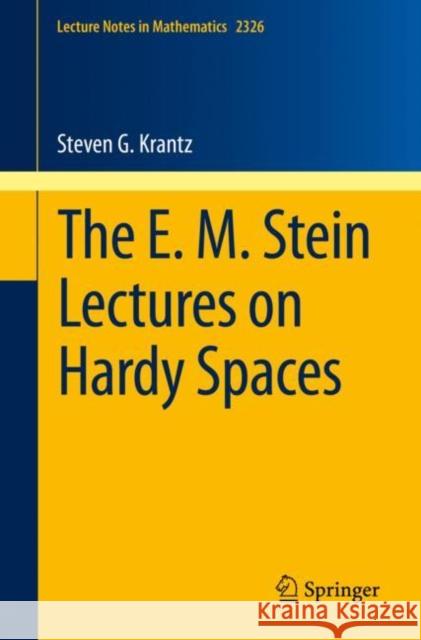The E. M. Stein Lectures on Hardy Spaces » książka
The E. M. Stein Lectures on Hardy Spaces
ISBN-13: 9783031219511 / Angielski / Miękka / 2023 / 296 str.
The bookThe E. M. Stein Lectures on Hardy Spacesis based on a graduate course on real variable Hardy spaces which was given by E.M. Stein at Princeton University in the academic year 1973-1974. Stein, along with C. Fefferman and G. Weiss, pioneered this subject area, removing the theory of Hardy spaces from its traditional dependence on complex variables, and to reveal its real-variable underpinnings.This book is based on Steven G. Krantz’s notes from the course given by Stein. The text builds on Fefferman's theorem that BMO is the dual of the Hardy space. Using maximal functions, singular integrals, and related ideas, Stein offers many new characterizations of the Hardy spaces. The result is a rich tapestry of ideas that develops the theory of singular integrals to a new level. The final chapter describes the major developments since 1974.This monograph is of broad interest to graduate students and researchers in mathematical analysis. Prerequisites for the book include a solid understanding of real variable theory and complex variable theory. A basic knowledge of functional analysis would also be useful.
The book The E. M. Stein Lectures on Hardy Spaces is based on a graduate course on real variable Hardy spaces which was given by E.M. Stein at Princeton University in the academic year 1973-1974. Stein, along with C. Fefferman and G. Weiss, pioneered this subject area, removing the theory of Hardy spaces from its traditional dependence on complex variables, and to reveal its real-variable underpinnings.This book is based on Steven G. Krantz’s notes from the course given by Stein. The text builds on Fefferman's theorem that BMO is the dual of the Hardy space. Using maximal functions, singular integrals, and related ideas, Stein offers many new characterizations of the Hardy spaces. The result is a rich tapestry of ideas that develops the theory of singular integrals to a new level. The final chapter describes the major developments since 1974.This monograph is of broad interest to graduate students and researchers in mathematical analysis. Prerequisites for the book include a solid understanding of real variable theory and complex variable theory. A basic knowledge of functional analysis would also be useful.











